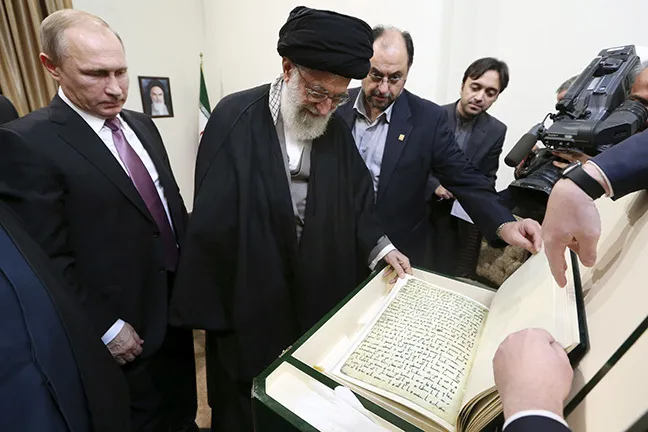In a landmark development, Iran and Russia have signed a $25 billion agreement to construct four new nuclear power reactors in southern Iran. The deal, announced by Iran’s official IRNA news agency, marks one of the largest energy collaborations between the two countries and raises significant geopolitical and security questions amid rising global tensions.
Under the agreement, Russia’s state-owned nuclear company Rosatom will oversee the construction of four Generation III reactors, each with a capacity of approximately 1,255 megawatts, totaling over 5,000 MW. The site, located in Hormozgan Province near the Persian Gulf, spans 500 hectares and is expected to play a critical role in Iran’s efforts to diversify its energy sources and reduce dependency on fossil fuels.
Iran currently operates one nuclear power plant — Bushehr, also built with Russian assistance — and has long faced electricity shortages, especially during peak summer months. This deal represents a significant step toward Tehran’s long-term goal of achieving 20,000 MW of nuclear-generated power by 2040.
A Response to Energy Needs — and Strategic Pressures
Iranian officials have emphasized the peaceful nature of the agreement, framing it as a response to domestic energy demands and a move toward environmental sustainability. However, the timing of the deal — amid efforts by Western powers to reimpose sanctions on Iran over its nuclear program — has led to widespread international scrutiny.
The agreement closely follows a memorandum of understanding signed earlier this year, in which the two countries outlined plans for expanding civilian nuclear cooperation. Iran’s Atomic Energy Organization and Rosatom are expected to collaborate not just on construction, but also on training, fuel supply, maintenance, and waste management.
Global and Regional Reactions
Western governments, particularly the United States and the European Union, have reacted with concern. The deal comes at a time when the United Nations Security Council is actively discussing the “snapback” of sanctions against Iran due to alleged violations of the 2015 Joint
Comprehensive Plan of Action (JCPOA).
The International Atomic Energy Agency (IAEA) is also expected to increase scrutiny of Iran’s nuclear activities. Although the current deal is for civilian power generation, experts worry about potential dual-use applications, where civilian technology and infrastructure could be diverted for weapons development.
In Washington and European capitals, the deal is viewed not only as a nuclear concern but also as a strategic maneuver by Russia to deepen its influence in the Middle East and challenge Western diplomatic and economic dominance.
Russia’s Geopolitical Gain
For Russia, the deal represents a major diplomatic and commercial victory. Rosatom secures a lucrative multi-year project, while Moscow strengthens its position as a global leader in nuclear technology — and a key ally to countries facing Western pressure.
The move is also seen as a signal of Russia’s intent to expand its strategic footprint in the Middle East, aligning with powers like Iran to counterbalance NATO and Western influence.
Middle East Reactions: Cautious and Divided
In the broader Middle East, reactions have been mixed:
Israel has expressed alarm, warning that the deal could embolden Iran’s nuclear ambitions.
Saudi Arabia and UAE have called for transparency and increased international monitoring of Iran’s nuclear activities.
Meanwhile, China has supported the Iran-Russia deal, emphasizing peaceful development and criticizing what it calls “unilateral” sanctions from the West.
Potential Consequences and Challenges
1. Nonproliferation Risk
While Iran insists on the peaceful nature of its nuclear development, the expansion of its nuclear infrastructure — especially with Russian support — raises legitimate questions about oversight and compliance. The IAEA will likely demand greater access, real-time monitoring, and adherence to international safeguards.
2. Sanctions and Diplomatic Fallout
The U.S. and EU may respond by tightening sanctions, possibly targeting entities involved in the deal, including banks, contractors, or suppliers. There is also the potential for secondary sanctions against third-party countries or companies assisting in the project.
3. Regional Security Dynamics
The deal could trigger a nuclear arms race or strategic recalibration among Iran’s regional rivals. Israel, in particular, may ramp up its covert and overt operations against Iranian nuclear facilities, while Gulf states may pursue nuclear partnerships of their own.
4. Economic and Technical Hurdles
The $25 billion project faces enormous financial and logistical demands. Iran’s economy, already under strain from sanctions and inflation, may struggle to sustain long-term investments. Additionally, over-reliance on Russia for fuel, maintenance, and technology could create vulnerabilities down the road.
The Iran-Russia nuclear deal represents far more than a commercial contract. It is a strategic alliance with wide-reaching consequences — from regional energy security to global nonproliferation policy. For Iran, the reactors promise power and prestige; for Russia, influence and income. But for much of the international community, the deal is a test of transparency, trust, and geopolitical balance.
As construction begins, the world will be watching not just the turbines and cooling towers rising in Hormozgan — but the diplomacy, tensions, and power plays unfolding behind the scenes.








